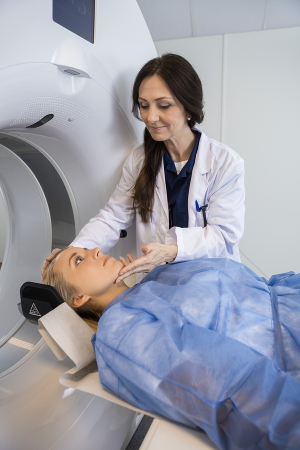by
John R. Fischer, Senior Reporter | July 16, 2019

Women who survived childhood
cancer may need a sole MR
exam instead of both an MR
scan and a mammogram for
breast cancer assessment
Women who underwent thoracic radiation to beat cancer in their childhood may benefit more from an annual MR exam alone for breast cancer screening.
That’s the claim made by researchers at the University of Toronto, who argue that current Ontario guidelines recommending annual mammography and MR screenings to survivors of hodgkin’s lymphoma are costly and provide little to no additional benefits in preventing cancer, compared to MR alone. They advise that more research be conducted to create more personalized exams based on an individual’s specific risk profile.
"To make the screening recommendations more personalized, the next step would be to have a better understanding of how the exact treatment exposures affect a female survivors' risk of breast cancer,” Dr. David Hodgson, a professor in the department of radiation oncology at the university, told HCB News. “The exact radiation dose to the breast tissue and the chemotherapy doses are now available for individual patients in more detail than ever before, but we don't yet understand how to convert those detailed exposures into predicted risks. Other important considerations will be how to reduce the system barriers to appropriate screening of young survivors and consider their individual preferences."



Ad Statistics
Times Displayed: 172607
Times Visited: 3116 For those who need to move fast and expand clinical capabilities -- and would love new equipment -- the uCT 550 Advance offers a new fully configured 80-slice CT in up to 2 weeks with routine maintenance and parts and Software Upgrades for Life™ included.
Women who survived HL in adolescence are at high-risk of developing breast cancer later in life, and are advised by current guidelines to undergo annual mammograms and MR screenings starting at age 30, the same for all high-risk women. Mammography, however, is not as sensitive as MR in its ability to detect new tumors, especially in patients under 50, causing some to question if both modalities are necessary.
Led by Ph.D. students Lauren Tessier and Jill Furzer from the Institute of Health Policy, Management and Evaluation (IHPME), researchers devised a modified breast cancer natural history model for HL survivors with a high risk of developing breast cancer, and simulated patients through different screening strategies starting at either age 25 or 30. Among the options were MR, mammography, or both. The life expectancy, quality of life, and associated healthcare costs for those diagnosed with breast cancer were then tallied based on frequency of screening, the timing of cancer detection and the cost of treatment.
Screening with both modalities at age 30, on average, was found to be more expensive and less effective than screening with MR alone. Researchers also concluded that adding MR to mammography screening for patients at age 25 added significant costs and did little to change life expectancy or quality of life.
The researchers recommend that screening for HL survivors begin at an earlier age than 30, and that more research be done to revise current guidelines to reflect a more personalized process of care.
"Additional benefits include patient time as well as physical comfort, given that a mammogram is more invasive than an MR. More evidence is required to build a strong enough case to revise the current guidelines,” said Furzer and Tessier. “Future work could include qualitative research on physician behavior in practice when counseling survivors of pediatric Hodgkin's lymphoma and other high-risk groups."
The findings were published in the
Journal of the National Cancer Institute.

